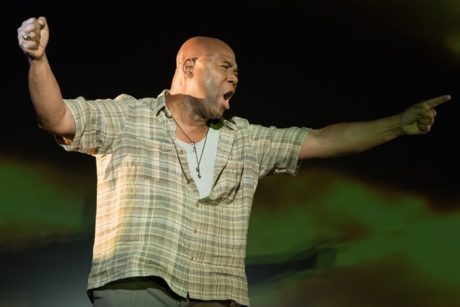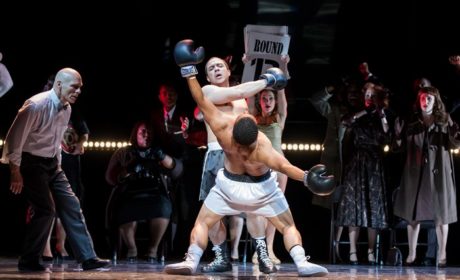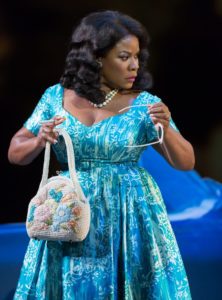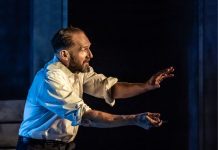In the fascinating contemporary opera Champion, the external world of the often-violent sport of boxing and the inner turmoil of the self-loathing and self-denial of the lead character collide to produce a visceral and transformative opera about the power of self-acceptance, forgiveness, and redemption.

Under the skillful Direction of James Robinson, the Washington National Opera Production of Champion is exciting and vibrantly alive with jazz-laden music by the prolific composer/musician Terrence Blanchard —music which is replete with resonant rhythmic percussion, blues-infused musical passages and ravishing full orchestral music that permeates the story with dramatic style and verve. A quartet of jazz musicians will join the WNO Orchestra for performances of Champion.
The Washington National Opera Orchestra under the Music Direction of Phillippe Auguin and the Conducting of George Manahan made musical transitions with fluidity and ease in complete synchronization with the dramatic libretto’s often trenchant subject matter. The Washington National Opera Chorus and dancers aided this superb opera with aplomb.
This opera— based on the real-life story of the renowned boxer Emile Griffith who was taunted for his sexuality and, unintentionally, killed his rival, Benny Paret —takes the audience on a journey through his many future championship successes, his family background and his confusion and eventual awakening to his true sexuality. The inability of Emile to forgive himself is the core of much of this absorbing and probing opera.
Michael Cristofer’s libretto initially seemed a bit obvious to me but, as the second Act unfolded, all the poetic passages and references came together to prove the thoughtful development of this image-filled libretto. Mr. Cristofer assimilates so many levels of Emile’s life that this opera is truly multilayered in the best sense. Cristofer utilized a very effective structural device of having the character of Emile portrayed in three stages of life—-in the current elderly stage (Bass Arthur Woodley), in flashbacks as the young Emile (Samuel Grace), and as the champion prizefighter in his prime (Aubrey Allicock).
Bass Arthur Woodley as the older Emile is the emotional mooring point of the opera. Mr. Woodley’s rich voice has a gravity and dignified strength that is very well-suited to the character of a man who has endured homophobia, physical violence, and self-loathing throughout his life. Throughout the opera, he sings with the resigned weariness of a man who may have been through too much suffering in his life. The repeated leitmotifs such as “Where are my shoe?”, “Where is my shirt?” and so forth show us a man who is trying to keep his emotional balance. Often, Woodley is perched above the stage looking down at the dramatic moments from his life. Woodley’s deep voice, also, often accompanied other versions of himself in earlier years as sung by Mr. Allicock and Mr. Grace.

Aubrey Allicock’s portrayal of the young Emile Griffith at the height of his prize –winning boxing fame is beautifully conceived and performed. He moves with the physical authority the role demands and he was always a pleasure to watch. Allicock’s preening in the scenes of his success and his visceral despair as he sings of the ambiguities of the heart as regards sexuality and manliness compel especially when he sings the aria “What makes a man a man?”
Stunning staging occurs when Allicock sings of his innermost thoughts and desires center stage while his Mother (Mezzo –Soprano Denyce Graves) urges him to come home from stage left and his wife (the wonderful Soprano Leah Hawkins) urges him to come to bed from stage right. This was extremely cerebral in terms of stagecraft that mirrored the disparate needs and desires of the characters.
As the young Emile, Samuel Grace’s treble soprano was a diverting breath of fresh air—even as the audience realizes what lies ahead for this innocent child.

The renowned mezzo-soprano Denyce Graves (Emelda Griffith) drew sustained applause after an absolutely sensitive and poignant aria musing about the early stages and hardships of her life. A rear visual projection of the sea (breathtaking Projection Design by Greg Emetaz) is shown while Ms. Graves’ gorgeous voice mesmerized with the repeated words “The Sea ain’t got no back door and all you do is drown.” Throughout all her scenes, Ms. Graves was nothing less than enthralling.
Tenor Frederick Ballentine as Luis Griffith was well-cast and naturally compelling as was the marvelous bass-baritone of Wayne Tigges as Howie, the fight manager (unfortunately, Mr. Tigges was feeling vocally indisposed but he mustered the strength to carry on by miming the fine singing of Samuel Schultz who sang from the sidelines).
Tenor Victor Ryan Robertson’s character of Benny Paret was convincingly portrayed in both of his dual roles -as the taunting boxer – and, as Paret’s son.
Special mention must be made of the exquisitely staged fight scene between Griffith and Paret. Choreographer Sean Curran and Fight Master Joe Isenberg portrayed all the tension and the violence of the boxing ring with aplomb. The stage space looked like a vivid canvas that had come to life.
Mention must be made once again as to the outstanding visual projections of Greg Emetaz which showed vast crowd scenes, fight footage, and so forth. These visuals aided immeasurably to the Set Design by Allen Moyer.
Costumes by James Schuette and Lighting Design by Christopher Akerlind were top-notch.
I cannot get the lines “I kill a man and the world forgives me. I love a man and the world wants to kill me” out of my head. This is a very powerful opera and so apt at this moment in time.
This tight ensemble under the astute Direction of James Robinson has delivered a fluid and penetrating look at violence and the hope of forgiveness and redemption. Champion is a knockout!
Running Time: Two hours and 30 minutes, including one 25-minute intermission.
LINK:
Watch a preview of Champion:
Champion plays through March 18, 2017, at Washington National Opera performing at The Kennedy Center’s Opera House – 2700 F Street, in Washington, DC. For tickets, call the box office at (202) 467-4600
Toll-Free: (800) 444-1324, or purchase them online.




